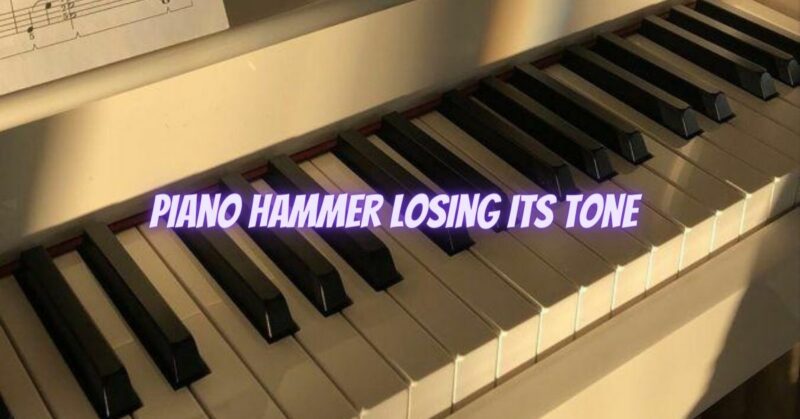A piano’s tone is a critical aspect of its musical expression. When a piano hammer loses its tone, the instrument’s sound quality and responsiveness can be negatively affected. This can be concerning for both pianists and piano owners. Let’s explore some common causes of a piano hammer losing its tone and potential solutions to address the issue:
Causes of a Piano Hammer Losing Its Tone:
- Wear and Tear: Over time, the felt on the piano hammers can wear down due to regular use. As the felt becomes compacted and flattened, it loses its ability to produce a rich and resonant tone.
- Environmental Factors: Changes in humidity and temperature can significantly impact piano hammers. Excessive moisture can cause the felt to swell, while dry conditions can lead to shrinking and hardening of the felt.
- Poor Voicing: Incorrect or inadequate voicing during piano maintenance can result in uneven tone production among the hammers. This can lead to some notes sounding dull or muffled compared to others.
- Hardened Hammers: Hammer hardening solutions, if applied excessively or incorrectly, can cause the hammers to become overly hard and produce a harsh tone.
- Hammer Felt Compression: Frequent striking of the strings can compress the hammer felt, causing it to lose its natural resiliency and tone.
Solutions to Restore Piano Hammer Tone:
- Voicing: Proper voicing is crucial to achieving an even and balanced tone across the piano. A skilled piano technician can use voicing needles to adjust the density and hardness of the hammer felt, restoring its responsiveness and tone.
- Hammer Filing: If the hammer felt is severely compressed or misshapen, the technician may use a filing technique to reshape the hammers and restore their original form.
- Hammer Replacement: In some cases, piano hammers may become too worn or damaged to be effectively voiced or filed. In such situations, the technician may recommend replacing the hammers entirely to restore the piano’s tone.
- Humidity Control: Maintaining consistent humidity levels in the piano’s environment can help preserve the integrity of the hammer felt. Using a humidifier or dehumidifier can help mitigate the impact of changing weather conditions.
- Regular Maintenance: Regularly scheduling piano maintenance and voicing sessions with a qualified technician ensures that any issues affecting the hammer tone are addressed promptly.
- Professional Assessment: If you notice a significant decline in the piano’s tone, it is best to consult a professional piano technician. They can assess the instrument thoroughly and identify the specific cause of the tone loss.
- Avoid DIY Fixes: Attempting to adjust or voice piano hammers without proper training and tools can cause irreversible damage. It is advisable to leave such tasks to qualified professionals.
Conclusion:
A piano hammer losing its tone can be a concerning issue, but it is often a normal part of the instrument’s wear and tear. Regular maintenance, proper voicing, and controlling environmental factors can help preserve and restore the piano’s tone. Consulting a skilled piano technician is essential for identifying the root cause of the problem and implementing appropriate solutions to ensure that the piano produces a beautiful and expressive sound for many years to come.


